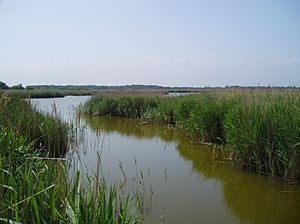Upper Thurne Broads and Marshes facts for kids
| Site of Special Scientific Interest | |

Hickling Broad
|
|
| Area of Search | Norfolk |
|---|---|
| Interest | Biological |
| Area | 1,185.9 hectares (2,930 acres) |
| Notification | 1988 |
| Location map | Magic Map |
The Upper Thurne Broads and Marshes is a very special natural area in Norfolk, England. It covers about 1,186 hectares (that's like 2,930 football fields!). This amazing place is north of Great Yarmouth and is known for its incredible wildlife.
It's so important that it's been given many special titles. It's a Site of Special Scientific Interest (SSSI) because of its unique plants and animals. It's also part of the Norfolk Coast Area of Outstanding Natural Beauty, which means it's a beautiful landscape protected for everyone to enjoy.
This area is also part of bigger protected zones like the Broadland Ramsar site (important wetlands worldwide) and a Special Protection Area for birds. It's also a Special Area of Conservation because of its rare habitats. Two parts of it, Hickling Broad and Martham Broad, are National Nature Reserves. These are managed by the Norfolk Wildlife Trust to keep them safe for nature.
What Makes This Area Special?
The Upper Thurne Broads and Marshes is one of the best wetland areas in all of Britain. It's super important around the world for its special wetland plants. It also provides a home for many different kinds of animals.
Lakes and Waterways
This area has four main lakes:
- Hickling Broad
- Heigham Sound
- Horsey Mere
- Martham Broad
Besides these larger lakes, there are many smaller water bodies. These include rivers, streams, and ponds. All these waterways are connected and create a rich environment.
Different Habitats
The Upper Thurne Broads and Marshes has a mix of different natural areas. These include:
- Swamp: Wet areas with lots of tall plants like reeds.
- Fen: Another type of wetland, often with rich soil and diverse plants.
- Woodland: Areas with trees, providing shelter for animals.
- Grazing Marsh: Open grassy areas where animals like cows might graze.
This mix of habitats helps many different species of plants and animals to live and thrive here. It's a truly amazing place to explore nature!
 | Bessie Coleman |
 | Spann Watson |
 | Jill E. Brown |
 | Sherman W. White |

